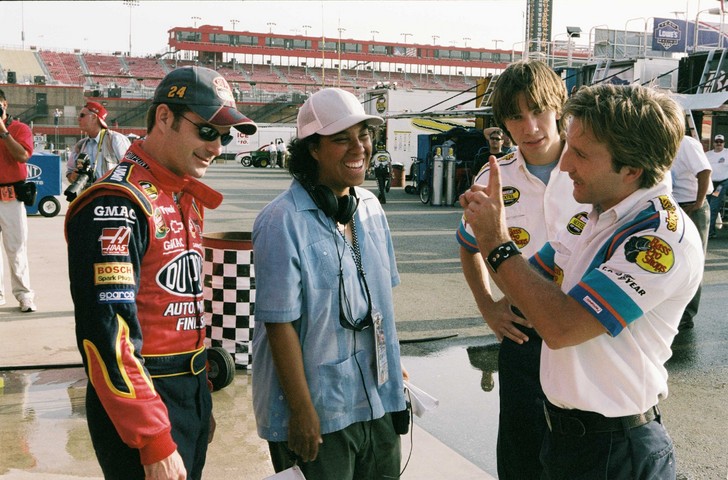Angela Robinson completed a B.A. in theatre at Brown University and an MFA at New York University. She’s probably best known for her 2004 film D.E.B.S., which starred Meagan Good, about a group of high school girls groomed to become secret agents. Robinson’s 2005 G-rated film Herbie Fully Loaded starring Lindsay Lohan and Michael Keaton is the highest grossing film directed by a black woman, grossing over $144 million at the box office worldwide.
Throughout her career, Angela Robinson has brought female- and lesbian-focused films to the big and small screens in a way that is unexplored by previous films and is appreciated by fans as authentic. On television, she has written, directed, and produced episodes of Showtime’s L-Word and joined the writing staff of HBO’s Hung, which she also produced. Along with fellow filmmaker Cheryl Dunye (Watermelon Woman, My Baby’s Daddy, The Owls) and promising newcomer Dee Rees (Pariah), Robinson is heralded and appreciated for her commitment to showcasing experiences of women and members of the LGBTQ community.
Upcoming on her slate of productions is the crime, drama, musical film GirlTrash: All Night Long (2012).
The “Pulp Fiction-style lesbian noir” story of five girls and one epic night. The girls will find love, lust, girl-fights, rock and roll, and a whole lot of stoned sorority girls.
GirlTrash is a prequel to her web series of the same title. Also look out for the female-focused cyborg movie Jenbot (2012), which Robinson will write, direct, and produce.
Below, she discusses working on D.E.B.S. and The L-Word.
Do you think the fact that D.E.B.S. is being made with such a major distributor and these actors reflects progress in terms of the acceptance of lesbian characters and issues in mainstream films? Could it have been made five years ago?
I do think the fact that the film is being made with a studio and with these actors reflects progress. The response to the script was really overwhelming. Screen Gems greenlit it right away, and we were barraged with actresses who wanted to be in the movie. The actresses I met with were generally not that worried about playing a gay character; they wanted to know how the relationship would be treated (i.e. is there nudity, etc.).
I don’t think this movie could have been made five years ago.
You wrote for the Showtime series The L Word for a brief time; what was that experience like, especially compared to writing for film?
Writing for The L Word was a really intense, fun experience. It’s totally different than writing for film, by yourself. Ilene (the show’s creator) and Showtime were really interested in mining the reality of lesbian lives, so you’d sit around for hours in a room and tell stories about your life or your friends or people you’d heard about. It was like being paid to attend a really fun dinner party. For me, it was the first time I’d written realism (I’m always writing overblown situations and hi-concept comic book stuff), which I enjoyed very much.
This kind of all-lesbian series has never been done before on TV; what was the most difficult aspect of writing that kind of show? The most fun?
The most difficult part is that since it has never been done, you feel an enormous pressure/responsibility to represent everybody, which is impossible. So you know you’re going to get all these upset letters because you didn’t do this thing, or didn’t include this person–but ultimately, the only task is to create an entertaining television show. The most fun is the people.
Full interview on After Ellen. |











Angela Robinson is definitely great!
I love all of Angela’s films!